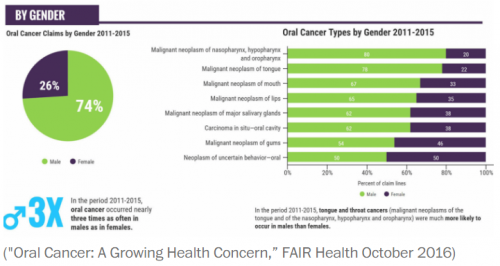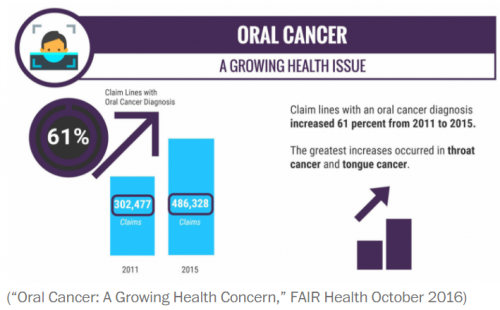Source: www.washingtonpost.com
Author: Ariana Eunjung Cha
Oral cancer is on the rise in American men, with health insurance claims for the condition jumping 61 percent from 2011 to 2015, according to a new analysis.
The most dramatic increases were in throat cancer and tongue cancer, and the data show that claims were nearly three times as common in men as in women during that same period with a split of 74 percent to 26 percent.
The startling numbers — published in a report on Tuesday by FAIR Health an independent nonprofit — are based on a database of more than 21 billion privately billed medical and dental claims. They illustrate both the cascading effect of human papillomavirus (HPV) in the United States and our changing sexual practices.
The American Cancer Society estimates that nearly 50,000 Americans will be infected this year, with 9,500 dying from the disease. In past generations, oral cancer was mostly linked to smoking, alcohol use or a combination of the two. But even as smoking rates have fallen, oral cancer rates have remained about the same, and researchers have documented in recent studies that this may be caused by HPV.
HPV infects cells of the skin and the membranes that lines areas such as the mouth, throat, tongue, tonsils, rectum and sexual organs. Transmission can occur when these areas come into contact with the virus. HPV is a leading cause of cervical, vaginal and penile cancers.
Surveys have shown that younger men are more likely to perform oral sex than their older counterparts and have a tendency to engage with more partners.
“These differences in sexual behavior across age cohorts explain the differences that we see in oral HPV prevalence and in HPV-related oropharyngeal cancer across the generations and why the rate of this cancer is increasing,” Gypsyamber D’Souza, an associate professor in the Viral Oncology and Cancer Prevention and Control Program at the Johns Hopkins Bloomberg School of Public Health, said at the time. The work was published in the Journal of Infectious Diseases.
In February, researchers at the American Association for the Advancement of Science meeting reported that men are not only more likely to be infected with oral HPV than women but are less likely to clear the infection. It’s not known why oral HPV is more aggressive in men.

HPV is an extremely common virus that has infected nearly 80 million, or one in four, people in the United States. Fortunately, the risk of contracting HPV can be greatly reduced by a vaccine. HPV has become a public health priority in recent years with dozens of countries recommending universal vaccination. The Centers for Disease Control and Prevention recommends that children get it at the age of 11 or 12, although they may get vaccinated as early as 9 years old. The CDC said earlier this month that young people who get it before the age of 15 need two doses rather than the typical three.
A CDC study has found that although fewer teenagers and young adults are having sex than in previous years, more are engaging in oral sex than vaginal intercourse under the assumption that it’s safer.
“However, young people, particularly those who have oral sex before their first vaginal intercourse, may still be placing themselves at risk of STIs or HIV before they are ever at risk of pregnancy,” the researchers wrote in the 2012 report.


Leave A Comment
You must be logged in to post a comment.